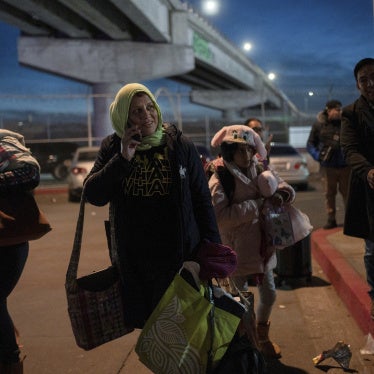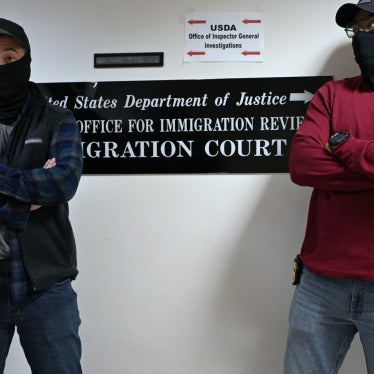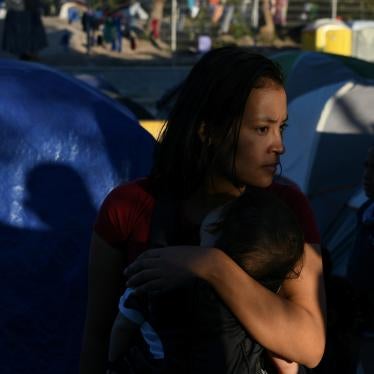Almost three years ago, the world heard a group of children sobbing in anguish after US border agents forcibly separated them from their parents. President Joseph R. Biden Jr. vowed as a candidate to end abuses of migrant children and pledged to “reassert America’s commitment to asylum-seekers and refugees.”
He started out strong. On Day One, he immediately lifted the travel ban affecting predominantly Muslim and African countries. He moved to strengthen Deferred Action for Childhood Arrivals (DACA), a program that suspends deportation of 800,000 people who came to the United States as children (though lasting protection is also needed through legislation). He’s calling for significant changes in US immigration laws, including legal status for some 11 million people without documents. His administration moved to pause deportations pending a review of Department of Homeland Security (DHS) policies, although that directive faced a temporary setback in court.
But his most recent actions are only partial steps toward the bold reforms that are sorely needed.
He's prioritized reunification of families forcibly separated under Trump administration policies that unapologetically targeted children in the name of deterrence. That’s good news for the hundreds of children and parents still living with the anguish of not knowing where their loved ones are, but it doesn’t squarely address the longstanding and ongoing practice of separating children who arrive with other relatives, such as grandparents, aunts, or older siblings.
Similarly, the Biden administration won’t place more people in the Migrant Protection Protocols (MPP), commonly known as “Remain in Mexico.” Under this program, the United States sent children and adult asylum seekers to dangerous border towns in Mexico, where they have been kidnapped, robbed, and raped and endured crowded, unhygienic conditions in migrant shelters and makeshift border camps.
But the president hasn’t yet committed to ending the program; instead, he’s directed the incoming Homeland Security secretary to review it. Aides have suggested the new administration would not move quickly to remove those currently in the MPP.
It’s true that fully unraveling this program--which has sent more than 70,000 people to Mexico to await US asylum hearings—in a fair and orderly way, particularly given the realities of the pandemic, will require careful planning and coordination by the Departments of Homeland Security, Justice, and State. There’s no good reason to delay that work, starting with a clear statement of intent to dismantle the program.
These agencies will need to develop a plan for people placed in the program to report to a US border crossing and be allowed to reenter the United States until their asylum claims are resolved. They shouldn’t have to wait until their next scheduled immigration court hearing—for many, that’s months longer in dangerous towns, separated from family and other support networks. People who should never have been in the MPP under a reasonable interpretation of the Trump administration’s own standards—including anybody who is pregnant, has medical conditions requiring specialized treatment or care, is living with a disability, or who is transgender—should be allowed to return to the United States as soon as possible.
Undoing this program should be coupled with reversing the Centers for Disease Control and Prevention (CDC) order authorizing summary expulsions without due process, adopted over career public health officials’ objections. Again, though, the president has opted for review. In both areas, reviews should be guided by clear goals.
When it comes to correcting course on asylum access, though, the methodical approach will serve the administration well. The new attorney general will have to review and reissue a bewildering array of agency rules and administrative decisions by outgoing Attorney General William Barr and his predecessor, Jeff Sessions, that have dismantled carefully developed asylum standards. Rulings by Barr and Sessions have foreclosed many asylum claims by people targeted by gangs, survivors of domestic violence, former child soldiers, and people whose families have paid ransom to armed groups to secure their release, among others.
But Biden’s seeming preference for study and caution can only go so far. One of the biggest challenges his administration faces is how to lead a major reimagining of border enforcement, emphasizing that the rule of law includes scrupulous adherence to US and international law protecting the right to apply for asylum, with a focus on humane and orderly processing of claims.
That means a dramatic shift of institutional culture in the immigration enforcement agencies, US Customs and Border Protection (CBP) and US Immigration and Customs Enforcement (ICE). This can’t happen without significant shifts in funding, consistent messaging from senior officials, clear and binding standards, and effective accountability mechanisms to address abuses to combat the widespread impunity that has plagued both agencies.
This work won’t always be easy, as the initial legal setbacks to Biden’s pause on deportations show. It will be tempting at times to declare victory and pull out.
The president and administration officials should stay the course and proceed at speed. Every day of delay means more children are hurt.









